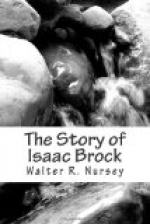THE MIDNIGHT GALLOP.
Well into the half-light of morning, long after the last of his staff, Evans, Glegg and Macdonell, had departed, Brock sat alone at his headquarters at Fort George, writing rapidly.
On the oak mantel, an antique clock chimed the passing of the historic hours, with deep, musical strokes.
Was it presentiment—a clearer understanding that comes to men of active brain and acute perception, during solitary vigil in the silence of night, when, with heart and soul stripped, they stand on the threshold of the great divide—that whispered to this “knight of the sword” his doom? Was it this clearer comprehension that caused our hero to bow his head as a faint message from an unseen messenger reached him? With a sigh of resignation he arose from the unfinished manuscript and passed on to his bedroom.
* * * * *
Boom! Boom! Boom!
* * * * *
A muffled, indistinct roar, a confusion of sounds, aroused the half-conscious sleeper. Brock sprang from his couch, partly dressed.
The antique clock chimed one—two—three!
“Listen,” he muttered to himself, “that was not a signal gun. Surely it was the sound of sustained firing.” As he unlocked the outer door, opening on the barrack-square, the sky above faintly aglow with the light of warning beacons, the low, steady roll of musketry and louder roar of distant cannon convinced him that this was far more serious than “the war between sentries.”
“My good Porter,” he said, speaking calmly to his excited servant, who, himself awakened, came rushing to his master, “have Alfred saddled at once while I complete dressing, and inform Major Glegg and Colonel Macdonell that I am off up the river to Queenston.”
In another minute Isaac Brock was in the saddle.
As he passed through the gates, thrown open by the sentry, a dragoon, mire from head to foot from furious riding, handed him a despatch announcing that the enemy had landed in force at Queenston. A second later, in response to the pressure of his knees, his horse was carrying our hero at a wild gallop across the common that separated his quarters from the upper village.
Day was near to breaking. The earth steamed from the heavy rain. Passing objects rose out of the dark mists, magnified and spectral.
At the residence of Captain John Powell, Brock reined up. The household was astir, aroused by the ominous roar of artillery carried down by the river from the gorge above. He stayed, without dismounting, long enough to take a cup of coffee brought to him by General Shaw’s daughter—a “stirrup cup”—his last. Then, giving his charger the spur, he rode away to death and distinction, tenderly waving a broken good-bye to the sad-eyed woman at the porch. This was his betrothed, who faintly fluttered her kerchief in weeping farewell to the gallant lover she would never see again.




